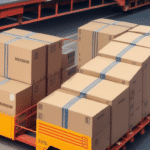How Ecommerce Brands are Leveraging Logistics Disruptors for Growth and Fulfillment
In today's digital age, online shopping continues to gain popularity, prompting ecommerce brands to seek innovative ways to maximize profits and expand their businesses. A critical area of focus is logistics, where emerging disruptors are revolutionizing traditional supply chains. By adopting these cutting-edge solutions, ecommerce brands can enhance growth and streamline fulfillment processes.
Introduction to Logistics Disruptors in Ecommerce
Logistics disruptors are transformative technologies or solutions that redefine product delivery methods, fundamentally altering traditional supply chain operations. In the ecommerce sector, these disruptors offer brands opportunities to enhance supply chain management systems, aiming to increase efficiency, reduce costs, and elevate the overall customer experience.
For instance, drones are being tested by companies like Amazon and UPS to deliver packages directly to customers' homes, bypassing conventional delivery routes. This innovation not only accelerates delivery times but also diminishes reliance on human labor and transportation expenses. Additionally, blockchain technology is utilized to track and authenticate products throughout the supply chain, ensuring customers receive genuine items. These examples illustrate how logistics disruptors are reshaping the ecommerce landscape, offering businesses novel avenues to optimize their operations.
Key Logistics Disruptors in Ecommerce
Drones and Autonomous Vehicles
Drones and autonomous vehicles are at the forefront of logistics innovation. They facilitate faster deliveries, especially in hard-to-reach areas, and reduce operational costs. According to a Forbes report, drone deliveries could save ecommerce companies up to $42 billion annually by 2030.
Artificial Intelligence and Machine Learning
AI and machine learning optimize supply chain processes by predicting demand, managing inventory, and enhancing route planning. These technologies enable ecommerce businesses to make data-driven decisions, improving efficiency and reducing costs.
Blockchain Technology
Blockchain ensures transparency and security in the supply chain by providing a decentralized ledger of all transactions. This technology helps in verifying product authenticity and reducing fraud, thereby increasing consumer trust.
Augmented Reality (AR) and Virtual Reality (VR)
AR and VR enhance the customer shopping experience by allowing consumers to visualize products in real-world settings before making a purchase. This reduces return rates and increases customer satisfaction.
Benefits of Incorporating Logistics Disruptors into Your Ecommerce Strategy
Integrating logistics disruptors into an ecommerce strategy offers numerous advantages:
- Increased Efficiency: Automation and advanced technologies streamline operations, leading to faster order fulfillment.
- Cost Reduction: Optimizing logistics processes can significantly lower operational expenses.
- Enhanced Customer Satisfaction: Faster deliveries and real-time tracking improve the overall customer experience.
- Expanded Market Reach: Innovative delivery methods enable brands to serve remote or previously inaccessible markets.
- Data Transparency: Technologies like blockchain provide transparency, fostering trust between brands and consumers.
According to a McKinsey report, efficient logistics can reduce costs by up to 20%, directly impacting the bottom line of ecommerce businesses.
Case Studies of Ecommerce Brands Successfully Using Logistics Disruptors
Amazon
Amazon has been a pioneer in adopting logistics disruptors. Their use of drone technology and robotic warehouses has significantly decreased delivery times and operational costs. Amazon's Prime Air aims to deliver packages within 30 minutes, showcasing the potential of drone deliveries.
Alibaba
Alibaba utilizes autonomous delivery vehicles and drones to reach customers in remote regions of China. Their Cainiao network integrates AI and machine learning to optimize delivery routes and inventory management, enhancing overall efficiency.
Zara
Zara employs AI-driven demand forecasting to manage inventory effectively, reducing overstock and stockouts. This approach ensures high availability of products while minimizing storage costs.
Challenges and Potential Risks Associated with Using Logistics Disruptors in Ecommerce
While logistics disruptors offer substantial benefits, they also present challenges and risks:
- Regulatory Compliance: Navigating the legal landscape for drone usage and autonomous vehicles can be complex and varies by region.
- Security Concerns: Increased reliance on technology heightens the risk of data breaches and cyber-attacks.
- Initial Investment Costs: Implementing advanced technologies requires significant upfront investment in infrastructure and training.
- Customer Trust: Gaining customer acceptance for automated delivery methods may take time.
- Scalability: Ensuring that logistics disruptors can scale with business growth is essential for long-term success.
Addressing these challenges requires strategic planning, robust security measures, and ongoing compliance with regulatory standards.
Tips for Implementing a Successful Logistics Disruptor Strategy
To effectively integrate logistics disruptors into your ecommerce operations, consider the following strategies:
- Develop a Clear Implementation Plan: Outline timelines, milestones, and expected outcomes to guide the integration process.
- Invest in Infrastructure: Ensure that you have the necessary warehouses, delivery vehicles, and technological tools to support new logistics solutions.
- Train Your Staff: Provide comprehensive training to your team to effectively utilize new technologies and understand their benefits.
- Establish Feedback Mechanisms: Collect and analyze customer feedback to continuously improve your logistics system.
- Stay Informed: Keep abreast of the latest technological advancements and industry trends to maintain a competitive edge.
- Prioritize Sustainability: Incorporate eco-friendly practices, such as using electric vehicles and sustainable packaging, to appeal to environmentally conscious consumers.
Implementing these tips can help ensure a smooth transition to advanced logistics solutions, enhancing both operational efficiency and customer satisfaction.
Future Trends in Logistics Disruptors and Their Impact on Ecommerce Growth
The logistics industry is poised for continued innovation, with several emerging trends set to shape the future of ecommerce:
- Blockchain Integration: Enhanced security and transparency in the supply chain through blockchain technology.
- Expansion of Autonomous Deliveries: Wider adoption of autonomous vehicles and drones for last-mile delivery, reducing costs and delivery times.
- AI and Predictive Analytics: Advanced data analytics for better demand forecasting and inventory management.
- Sustainability Initiatives: Increased focus on eco-friendly logistics practices to reduce the environmental impact.
- Immersive Technologies: Use of AR and VR to create more engaging and interactive shopping experiences.
According to a GS1 report, the integration of these technologies is expected to drive significant growth in the ecommerce sector, enabling brands to meet evolving consumer demands efficiently.
As these trends develop, ecommerce brands must adapt and incorporate emerging logistics disruptors to sustain growth and maintain a competitive advantage in the market.
Conclusion
Logistics disruptors are fundamentally transforming the ecommerce landscape, offering brands innovative solutions to enhance growth and fulfillment. By embracing technologies such as drones, autonomous vehicles, AI, and blockchain, ecommerce businesses can achieve greater efficiency, reduce costs, and improve customer satisfaction. However, successful integration requires careful planning, investment, and a commitment to overcoming associated challenges. As the industry continues to evolve, staying informed about future trends and adapting strategies accordingly will be crucial for sustained success.






















